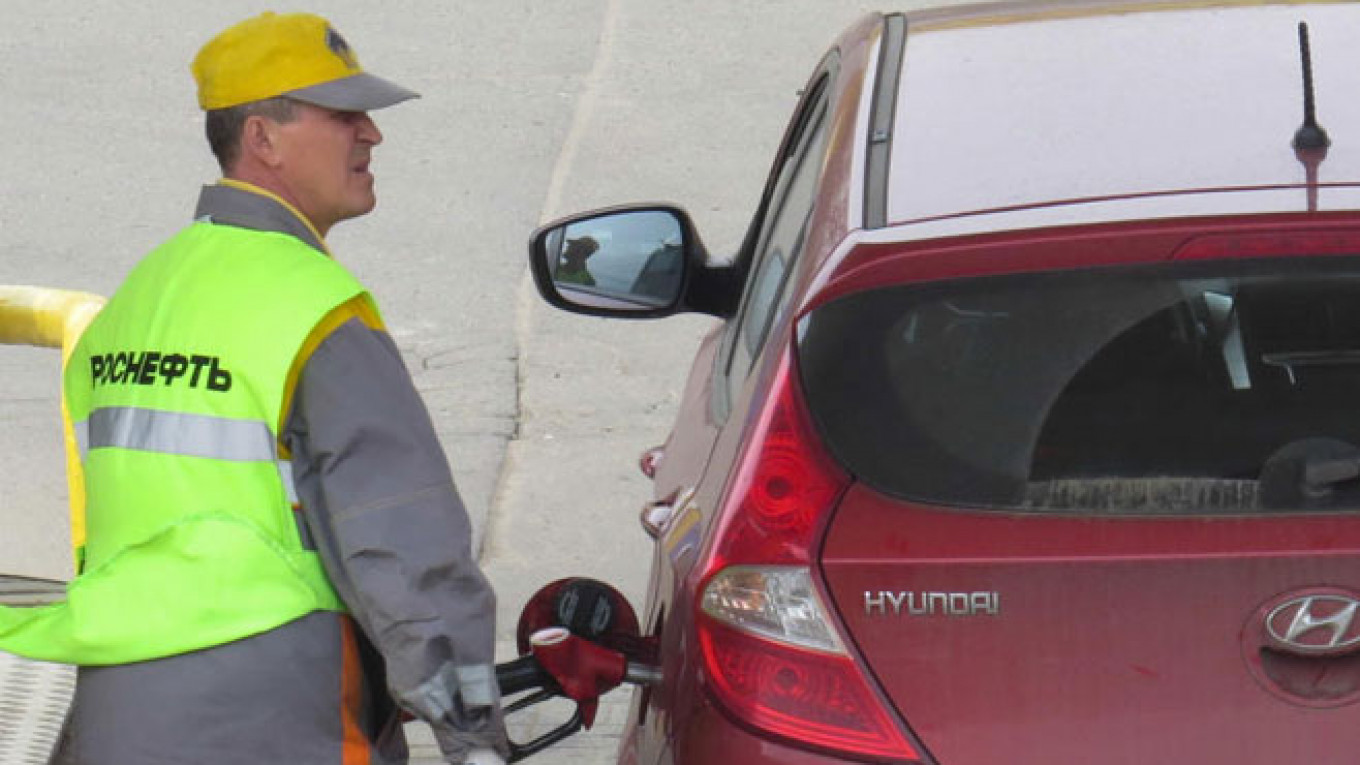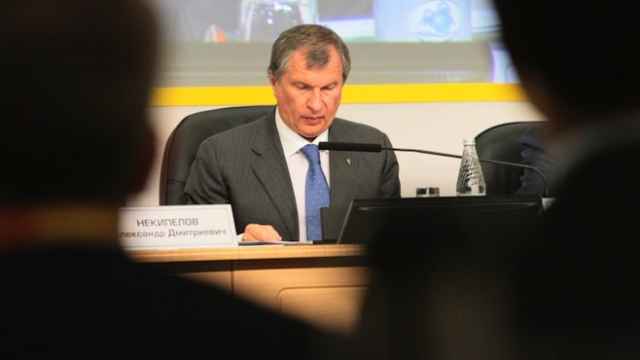The price for gasoline, which has grown steadily in Russia since the beginning of the year, is expected to rise steeply in 2015 as new duties and an imbalance of supply and demand take their toll, putting further pressure on the already staggering economy.
Since the beginning of the year the prices for gasoline at fueling stations in Russia have grown by 8 to 10 percent, depending on the type of fuel, which was slightly higher than the rate of inflation, which is at around 8 percent. Currently, regular unleaded in Moscow on average costs 33 rubles per liter (70 cents).
But the growth of wholesale prices was much higher, constituting on average as much as 30 percent since the beginning of the year, according to the state statistics agency Rosstat.
The wholesale price hike was caused by excessive export of fuel between the end of last year and the beginning of this year, said Mikhail Turukalov, the head of business development at Commodities Markets Analysis, a Moscow-based commodities trade consultancy.
"A series of fires that broke out at some of Russian oil refineries in February and March, combined with a large-scale modernization of others, has only made things worse, pushing the spot prices for gasoline even higher," Turukalov said.
But gasoline prices for consumers are not growing as rapidly as they do on the wholesale market, in part due to the actions of government regulatory bodies and an informal government policy that favors keeping gas prices equal to the level of inflation, analysts said.
Earlier this month the Federal Anti-Monopoly Service launched an investigation into gasoline prices set by three major oil companies — Bashneft, LUKoil and Rosneft — on suspicion of an agreement to manipulate spot prices for gasoline, which, in turn, were bringing up the retail price.
Moreover, oil companies, the biggest of which are state-owned, can afford to keep their retail prices for gasoline down, forcing small independent producers to do the same and as the result operate a notch above their costs, if not below them, said Yevgeny Arkusha, president of the Moscow Fuel Association.
"But this means uncertainty for prices in the future as it is unknown how long small producers can keep up with the losses," Arkusha said, adding that he was doubtful the government's efforts to keep gasoline prices below the level of inflation were likely to succeed next year.
The so-called "tax maneuver," passed by the State Duma in second reading on Tuesday, will only add fuel to the fire. It foresees cuts to oil export duties in exchange for an increase in the mineral extraction tax and growth of duties for the production of gasoline. This will ultimately lead to fuel price hikes for the consumers.
The Finance Ministry earlier estimated that gasoline prices will grow by 3 rubles per liter on average as the result of the maneuver. Several members of the Duma estimated that prices next year could grow overall by 15 to 20 percent.
Andrei Krutov, a member of the Duma council on energy, told the TASS news agency on Tuesday that the average price for gasoline by the end of 2015 could grow to as much as 50 rubles per liter, an over 40 percent increase to the current average.
The demand for gasoline in Russia is growing steadily, increasing with each passing year by 3 percent on average as the number of cars in the country grows. This means that even without factoring in the increased taxes and other problems faced by the industry today, gasoline prices will undoubtedly grow next year, hitting consumers and businesses and further undercutting Russia's already near-zero economic growth.
Contact the author at [email protected]
A Message from The Moscow Times:
Dear readers,
We are facing unprecedented challenges. Russia's Prosecutor General's Office has designated The Moscow Times as an "undesirable" organization, criminalizing our work and putting our staff at risk of prosecution. This follows our earlier unjust labeling as a "foreign agent."
These actions are direct attempts to silence independent journalism in Russia. The authorities claim our work "discredits the decisions of the Russian leadership." We see things differently: we strive to provide accurate, unbiased reporting on Russia.
We, the journalists of The Moscow Times, refuse to be silenced. But to continue our work, we need your help.
Your support, no matter how small, makes a world of difference. If you can, please support us monthly starting from just $2. It's quick to set up, and every contribution makes a significant impact.
By supporting The Moscow Times, you're defending open, independent journalism in the face of repression. Thank you for standing with us.
Remind me later.






